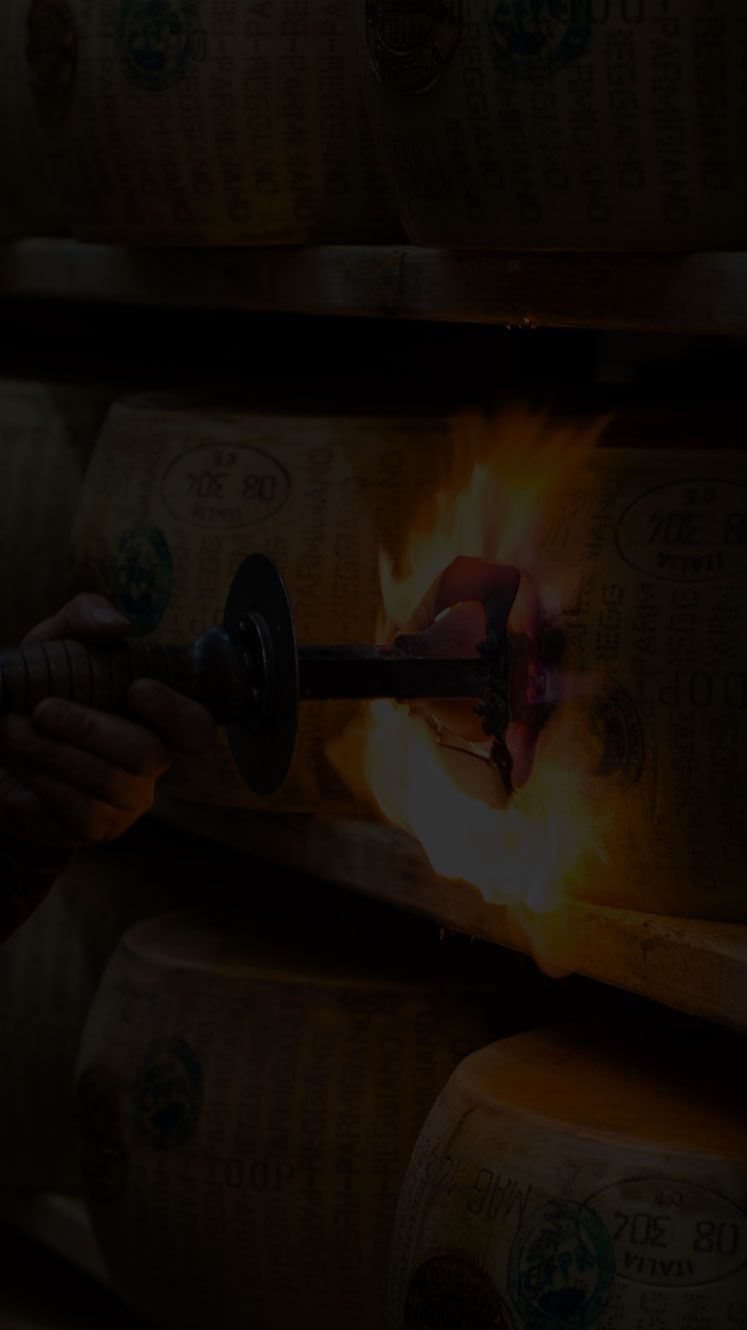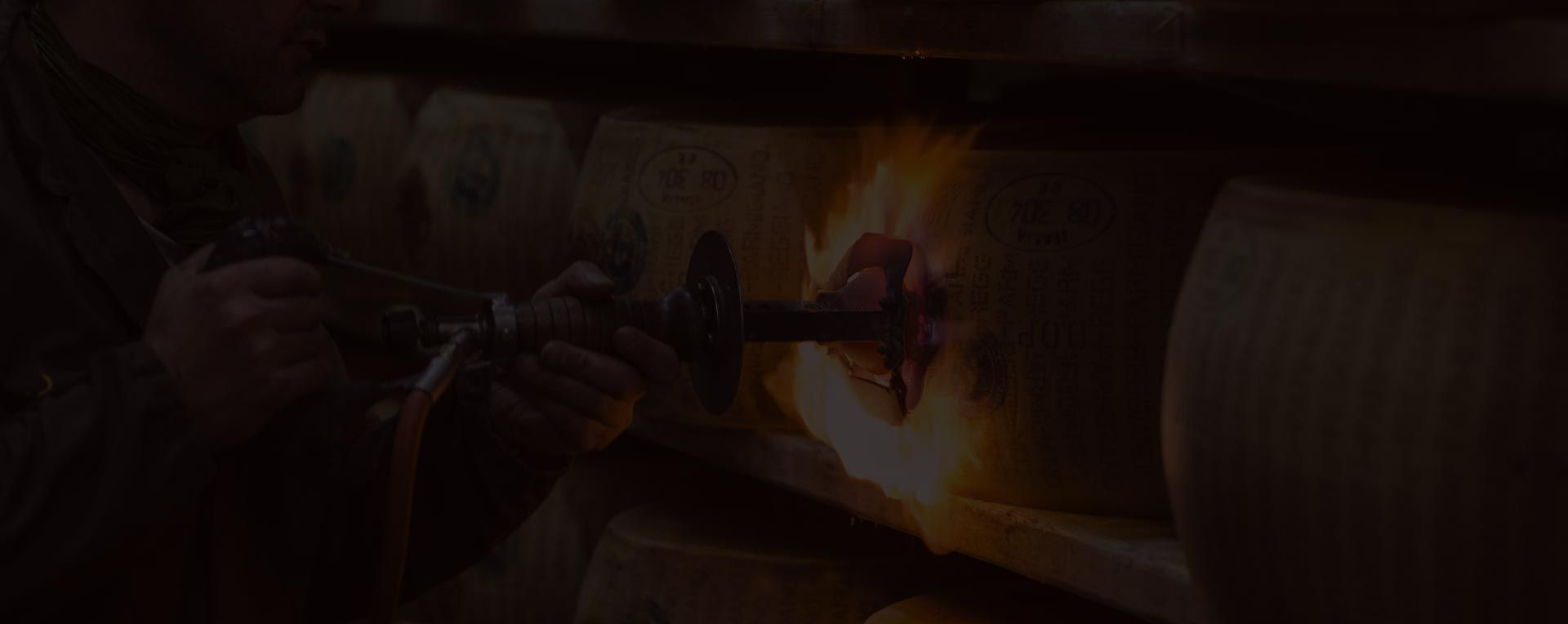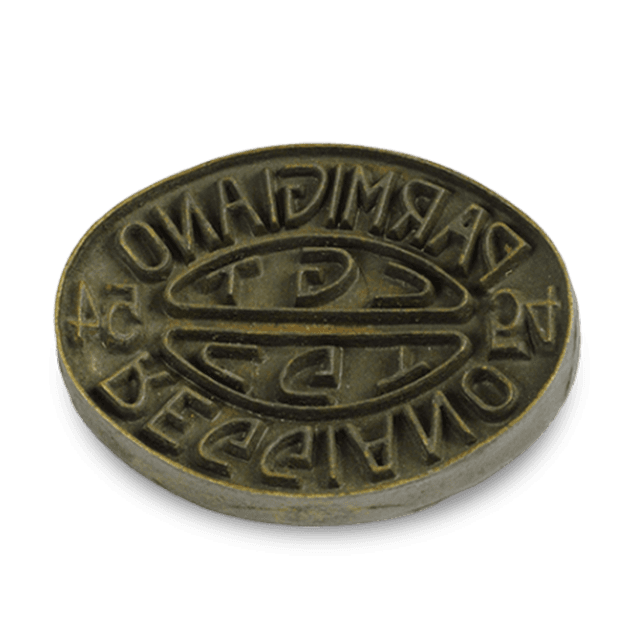

Seals and marks

Marks of origin
The MARKS OF ORIGIN engraved during the first hours of life of the wheels using the stencilling band all around the cheese rind. The information provided is:
- dotted wording Parmigiano Reggiano
- PDO and Consortium inscriptions
- dairy identification number (in 3 different positions)
- month and year of production (in 3 different positions)
- identification mark (health requirement identifying the production plant)
The CASEIN PLATE applied on one of the two flat surfaces of the wheel during its very first hours of life bears a unique and progressive alphanumeric traceability code which allows to trace the day when the wheel was born and in what dairy.
The grade selection mark
The grade selection mark is engraved at the end of the 12 months of maturation, on those wheels that pass the quality inspection to which all the wheels produced are subject.
The inspection is carried out by quality inspectors of the Consortium and following the certification issued by the PDO control body, the mark is hot-iron branded in an indelible way.
It is indeed the Consortium that holds the PDO marks of Parmigiano Reggiano, thereby identifying the cheese in the various categories during the quality control for the compliance with the PDO and supervises the correct use of those marks.
The quality control identifies three cheese categories:
The first category: Parmigiano Reggiano, namely cheese with a compact-textured paste and features compliant with the specifications (first-grade, zero, one), suitable for a long maturation to be enjoyed both in chunks during meals and in food preparations as grated cheese. Therefore the wheels bear the marks of origin (dotted inscription and casein plate) and the oval hot-iron mark.
The second category: “Medium-grade” Parmigiano Reggiano, namely cheese that shows minor or moderate defects in the structure of its paste and/or on the rind, yet that do not alter the typical organoleptic characteristics of the product. It is ideal for direct consumption as a table cheese. These wheels as well bear the hot-iron selection mark “Parmigiano Reggiano”, but they differ from the first-grade ones because of the parallel grooves engraved all around the cheese rind.
The third category: classified as “downgraded”, namely cheese that, showing major defects, is not compliant with the Parmigiano Reggiano specifications. These wheels are downgraded by eliminating the marks of origin through the removal of the rind (a few millimetres). Therefore, this cheese cannot show any reference to the PDO.

A further selection: the “Premium” and “Export” marks
Starting from the 18th month of maturation, dairies may request the Consortium to affix an additional mark on first-grade Parmigiano Reggiano:
- PREMIUM or EXPORT mark: it gives trading companies and consumers a further indication of the quality of Parmigiano Reggiano.
These marks can be affixed also on the packaging of the cheese selected in this way.
The marks on packaged Parmigiano Reggiano
Since 2012 the packaging of Parmigiano Reggiano, grated and in pieces, with and without rind, has to be be carried out exclusively within the area of origin by authorised and certified entities.
The label of the product has to include the certification logo “Parmigiano Reggiano piece and wheel” and, since April 2018, the cheese pieces have to specify the minimum maturation in addition to all the information established by the legislation in force:
- PDO symbol
- wording of the certification by the Italian Ministry of Agriculture (Mipaaft)
- identification mark as a health requirement identifying the packaging plant

Consortium’s Quality Project “Mountain Product”
In 2013, EU Regulation no. 1151/12 introduced the denomination “Mountain Product” to identify food products coming from mountain areas in the European Union.
Parmigiano Reggiano is the most important PDO product made in the mountains, with over 110 dairies located in the mountains and over 1200 cattle farmers who, every day, contribute to strengthening the economy and preserving the uniqueness of the mountain areas of Parma, Reggio Emilia, Modena and Bologna. In order to further support sustainability in mountain areas and to offer guarantees that include, in addition to its origin, the quality of the cheese, the Parmigiano Reggiano Consortium has launched “Quality Project - Mountain Product.”

The certification requirements are:
- Dairy production, with a maturation period of a minimum of 12 months, in the mountain area or up to 30km from the administrative border of the mountain area.
- At 20 months, a "hammer" evaluation must be carried out by Consortium experts.
- Obligation to show the dairy on the label.
Dairies with certified production:
Caseificio Soc. Tre Torri (MO)
Cooperativa Casearia del Frignano (MO)
4 Madonne Caseificio dell'Emilia (MO)
Caseificio Soc. San Pietro e Paolo (MO)
4 Madonne Caseificio dell'Emilia (MO)
Caseificio Sociale Rio San Michele (MO)
Caseificio Soc. San Pietro (MO)
Caseificio Soc. San Pietro in Rio Torto (MO)
Caseificio Soc. di Casola di Montefiorino (MO)
Industria Casearia di Pievepelago (MO)
Caseificio Soc. Roncoscaglia (MO)
Cooperativa Casearia Belvedere (MO)
Caseificio Soc. Beato Marco (MO)
Caseificio Soc. La Guardia (MO)
Caseificio Sociale Nuovo Malandrone (MO)
Azienda Agricola Sant'Antonio (MO)
Ferrari Giovanni Industria Casearia 2097 (PR)
Ferrari Giovanni Industria Casearia 2100 (PR)
Latteria Sociale Val Bardea (PR)
Azienda Agricola La Villa (PR)
Caseificio Soc. di Ponte Bratica (PR)
Latteria Soc. agricoltura di Vezzano (PR)
Latteria Soc. Costa di Bazzano (PR)
Caseificio Soc. Borgotaro (PR)
Latteria Soc. San Giorgio (RE)




